FOOD SECURITY
KZN farmers band together: ‘The land was fertile but people were starving’
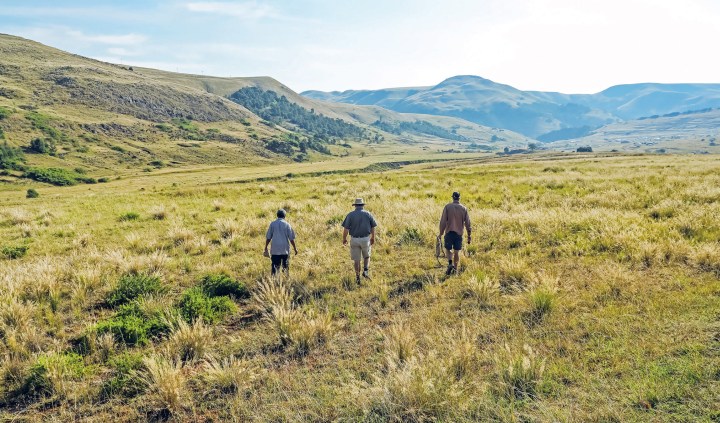
In the shadows of the Ukhahlamba/Drakensberg mountains, commercial farmers have banded together to advance local agricultural development and food security.
Good news spreads fast! After DM168 reported the stories of citizens finding solutions that use sport (mountain-bike racing) and tourism to advance education and rural development in the Underberg area of KwaZulu-Natal, we were contacted by agricultural activist Dylan Weyer, who asked, “On the back of that, would you perhaps be interested in writing an article about our organisation which operates in the same area?”
Not given to shunning stories about activism for social justice, it didn’t take us long to accept his invitation.
Also read: A mountain bike race like the great KAP sani2c can raise a village and rural education
Weyer studied environmental science at Rhodes University and then spent years working on water in arid areas of the northeastern Cape. But since his days as a student, Weyer says “reconciliation struck a chord and it turns out that partnerships around farming are an incredible vehicle for it. I was a bit sceptical to begin with, but have been struck by the measure of goodwill. There’s a bad stigma attached to the commercial farming community, for obvious reasons, but I’ve seen how working together, turning the soil, achieves connection and racial barriers come down.”
Weyer, who describes himself as being “in love with our continent and engaging with people in rural communities”, is the project manager of Harry Gwala Agri (HGA), a non-profit organisation working on agricultural development and household food security.
HGA’s field of operations is the Harry Gwala district municipality, a vast rural district with borders running down the flank of the Drakensberg mountains and stretching almost to Pietermaritzburg, which includes the towns of Kokstad, Ixopo and Underberg.
The beauty of the district is as stark as its poverty. It encompasses some of South Africa’s richest commercial farmland, yet is also blighted by widespread unemployment, hunger and malnutrition.
According to Weyer, HGA was set up because of a feeling among its founding farmers that “a very successful farm could not exist easily next door to abject poverty. For them to thrive they needed to see the people around them thriving”.
HGA was established in 2017 by local farmers John Bredin and Rob Stapylton-Smith, both members of its board of directors.
Its volunteers are either local farmers or people who have farming experience.
According to its website: “The initiative is founded on the belief that commercial farmers can no longer live as islands of prosperity amid a sea of poverty and that action needs to be taken to extend support to those for whom agriculture is an important or potential livelihood option and who have the motivation and will to improve not only their own circumstances, but who, with the right guidance and resources, can make a meaningful contribution to the local economy.”
Weyer says that initially the farmers had reached out to the local municipality to build partnerships but “after making no headway”, decided to set up a non-profit organisation as the vehicle for their vision.
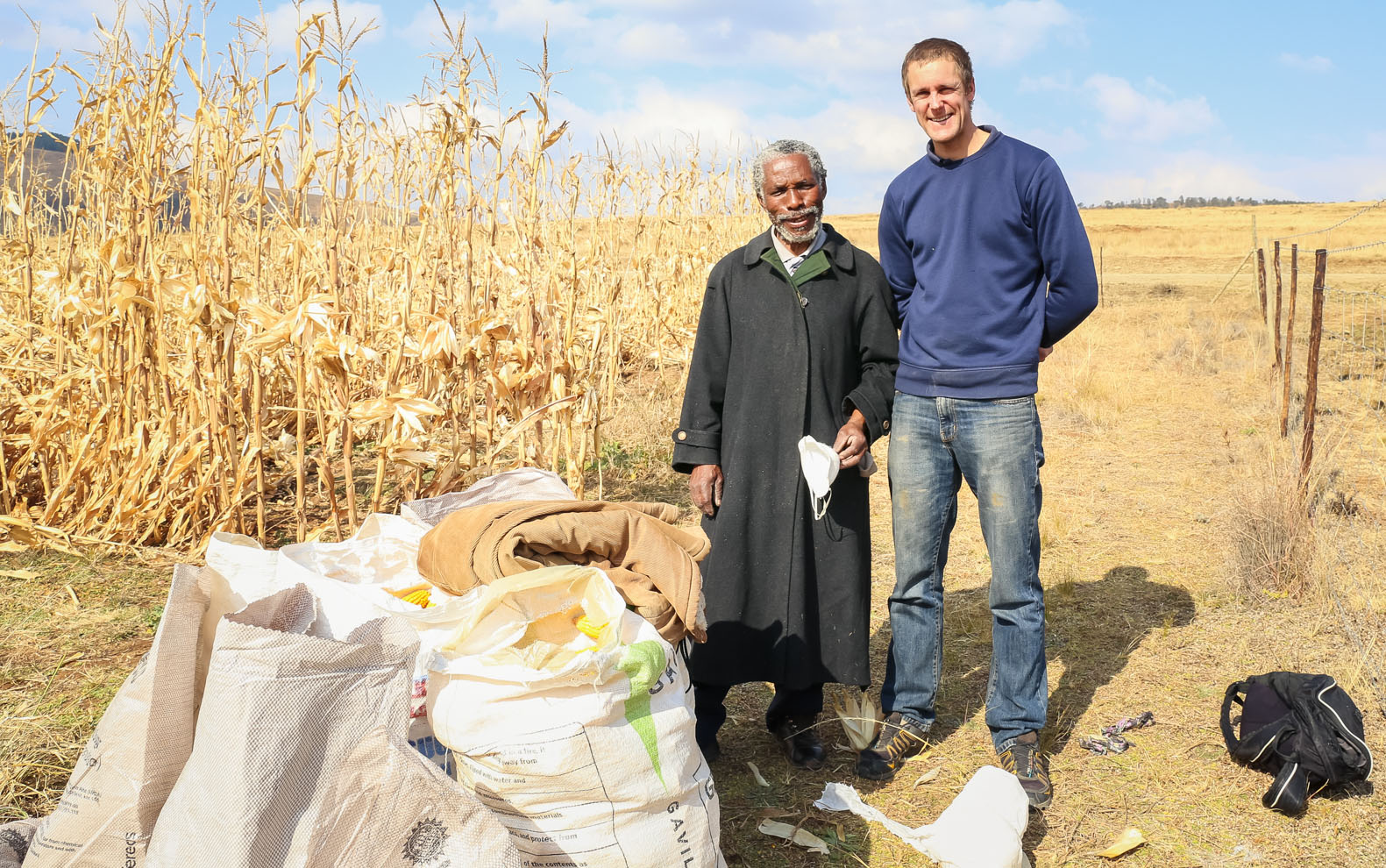
Absolom Mazibuko (Mphithini Co-op) and Dylan Weyer (HGA) at Mphithini’s project site in October 2020. (Photo: Lianne Ashton)
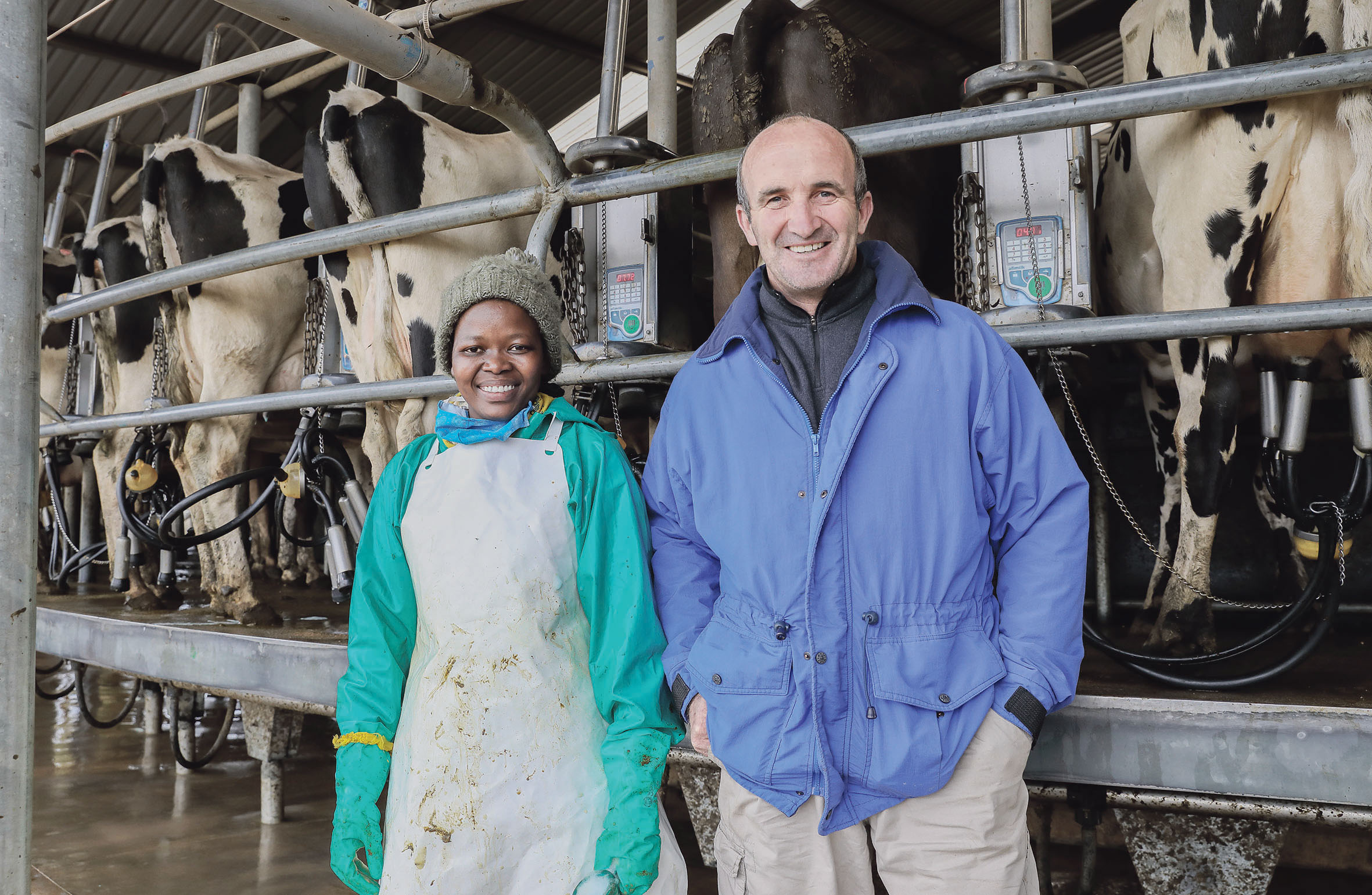
Zandile Nzimande (one of HGA’s top-performing students) and Mark Hauff (her host farmer) in October 2020. (Photo: Lianne Ashton)
Making a difference
Several years later Harry Gwala Agri is coming of age. Although only employing two people, it has formed a network of successful programmes, seeded hope and is making a difference to lives.
Its student in-service training programme, organised in conjunction with the Esayidi Technical and Vocational Education and Training (TVET) college in uMzimkhulu, facilitates the training and education of a new generation of black farmers by placing agricultural management students on farms and offering hands-on skills development and mentorship.
Before HGA, the Esayidi TVET had no system in place for farm management students to receive the 18 months of experiential learning they needed to obtain diplomas. As a result, the vast majority of up to 200 students the TVET enrolled every year found themselves unable to graduate.
So far more than 60 students have been placed on 24 host farms for 18 months.
More than R1.1-million has been raised and paid to the students in stipends because, according to HGA, “for 50% of the students this was the only income they were receiving outside of government grants”.
Although not envisaged at the outset, post-training support is also offered “to ensure that participating students ultimately receive their qualifications”.
With cows mooing loudly in the background, DM168 spoke to one of the students, 30-year-old Zandile Nzimande, during her lunch break. She was raised by her mother and grandmother on a farm in the area and talks proudly of how after first studying agriculture she enrolled in farm management at the TVET. She was one of the 20 students selected for placement in 2019. Many more had applied.
“I love animals and had wanted to be a vet. But it didn’t happen. That’s life. I’m not from a rich family. But now I’m a farm assistant. I have a job and one day I hope to own my own business dealing with animals.”
HGA also runs agricultural mentorship projects: its 2021 annual report says that so far there have been 14 mentorship projects with 26 projects (mentorship and other) receiving financial support from commercial farmers. One of these is Imphithini Primary Cooperative (IPC), run by local people from Imphithini village, near Donnybrook, a village that has more than 185 households.
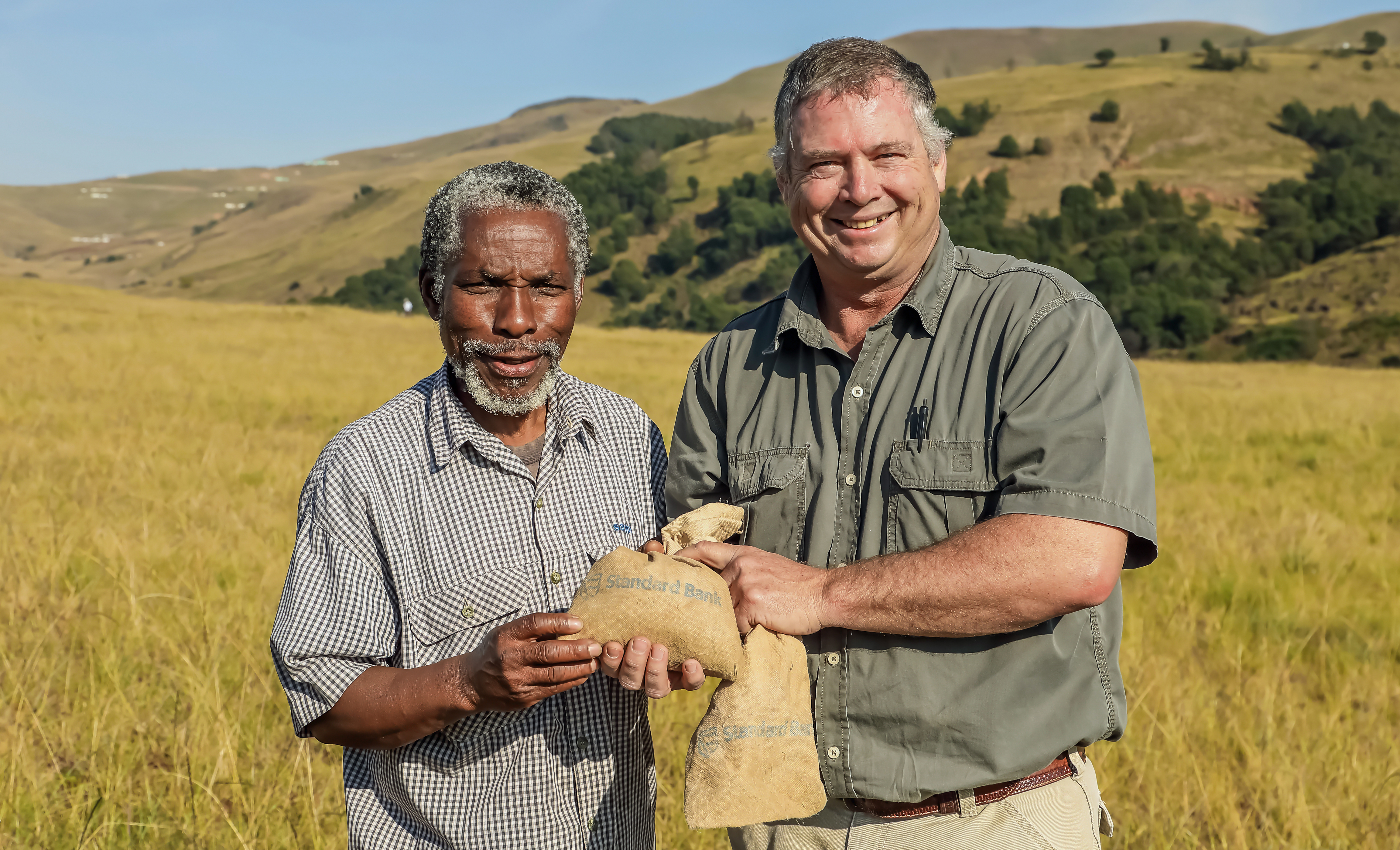
Absolom Mazibuko (Mphithini Co-op) and Graeme Horne (Omnia) during soil sampling in October 2020. Standard Bank provided the funding to support Mphithini in the first year. (Photo: Lianne Ashton)
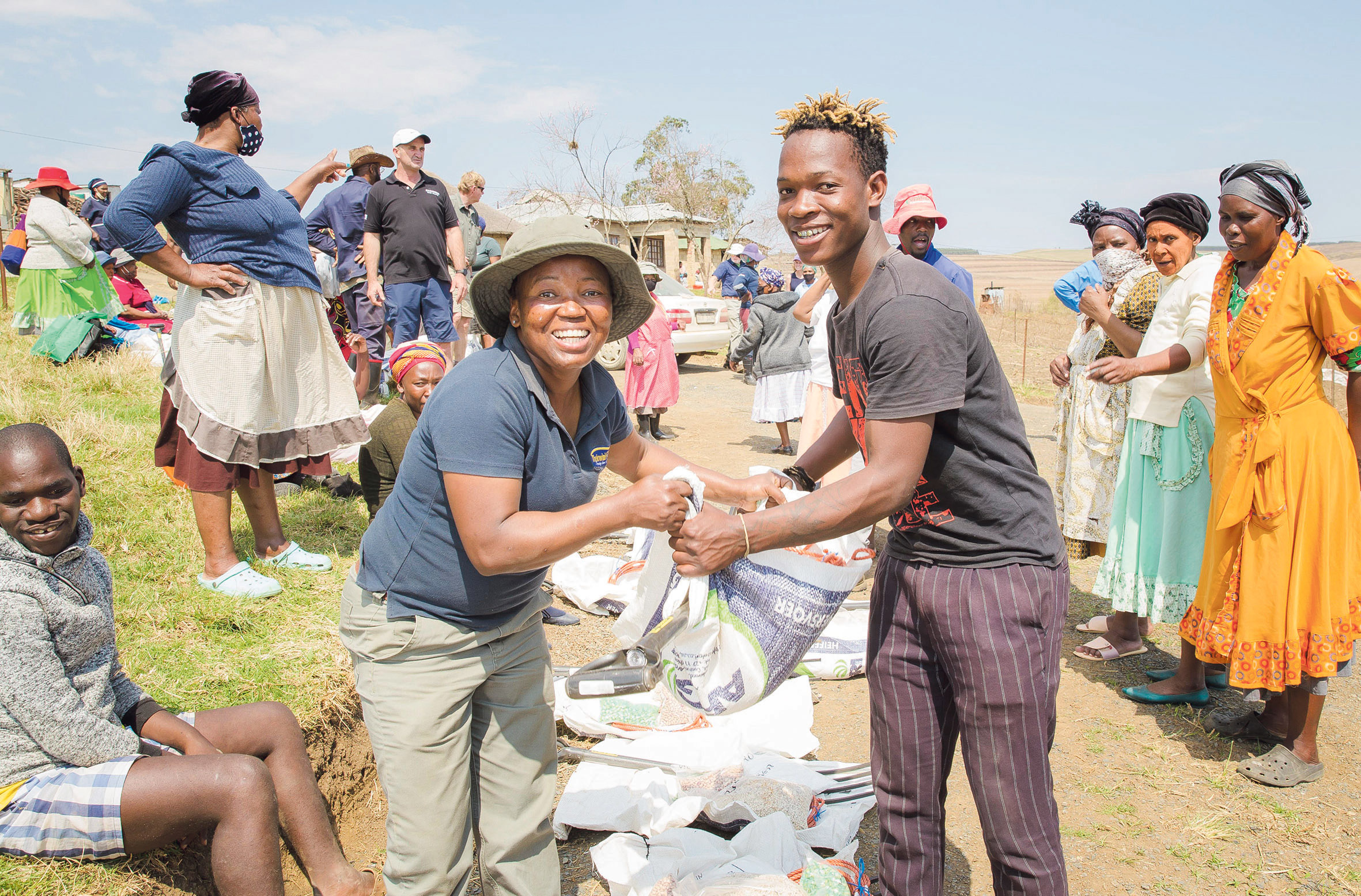
Recipients of the starter packs commercial farmers put together to assist rural households in the first step towards growing their own vegetable gardens at home in October 2020. (Photo: Lianne Ashton)
Working together
The founder of IPC is 69-year-old Mdeleli Absolom Mazibuko. He told DM168 how he had started IPC in 2017 “because we saw people starving, especially in our rural areas. People had to go to Pietermaritzburg to get food, and yet there was land here that was doing nothing. It was fertile, but we didn’t use it.”
As a result Mazibuko and others negotiated with the Inkosi for the use of 20ha of land. Fortuitously, he says, he met Stapylton-Smith at a community policing forum and successfully solicited his support.
“Since that time we have kept ourselves busy. Before, we were farmers, but we couldn’t rely on it. We didn’t get much crop. They have provided financial assistance, taught us soil testing, about seeds and fertiliser. They made us know about marketing our produce and how to contact other companies.”
The results speak for themselves.
According to Mazibuko, they started with 2ha in 2019 and their crop yield was 10.5 tons of maize.
The income from the sales of that year’s crop was reinvested and, according to the HGA 2021 annual report, “a different sales approach was taken this year with the co-op deciding to target the large number of communities that reside around them as a market”.

The ladies from the dynamic and successful One Home One Garden project based out of Hlutankungu near Highflats in October 2020. (Photo: Lianne Ashton)
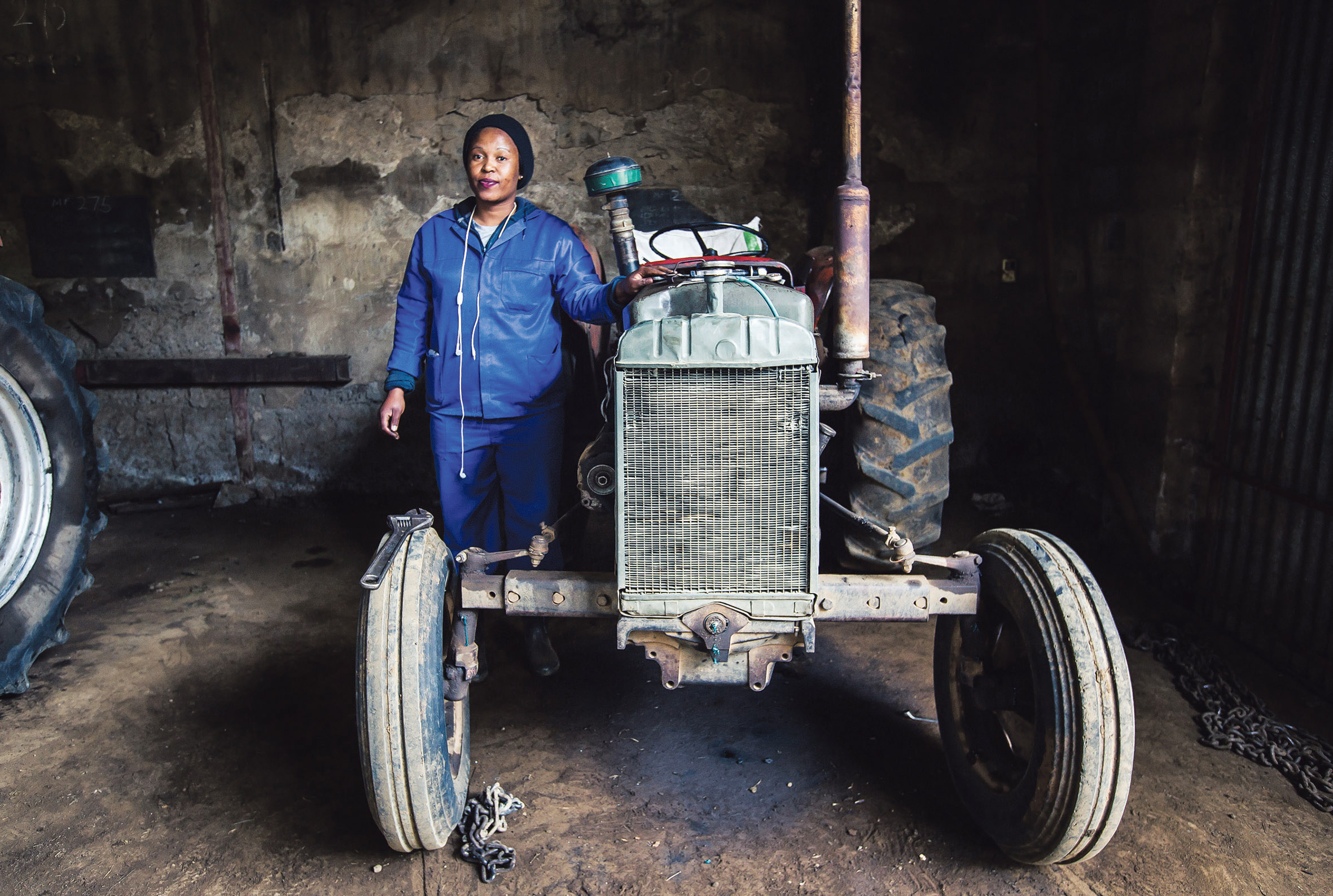
Lindelwa Mafu enjoyed 18 months at the Reynold’s dairy farm in 2020, where she was involved in a range of different tasks, including maintenance. She has since obtained her National Diploma. (Photo: Lianne Ashton)
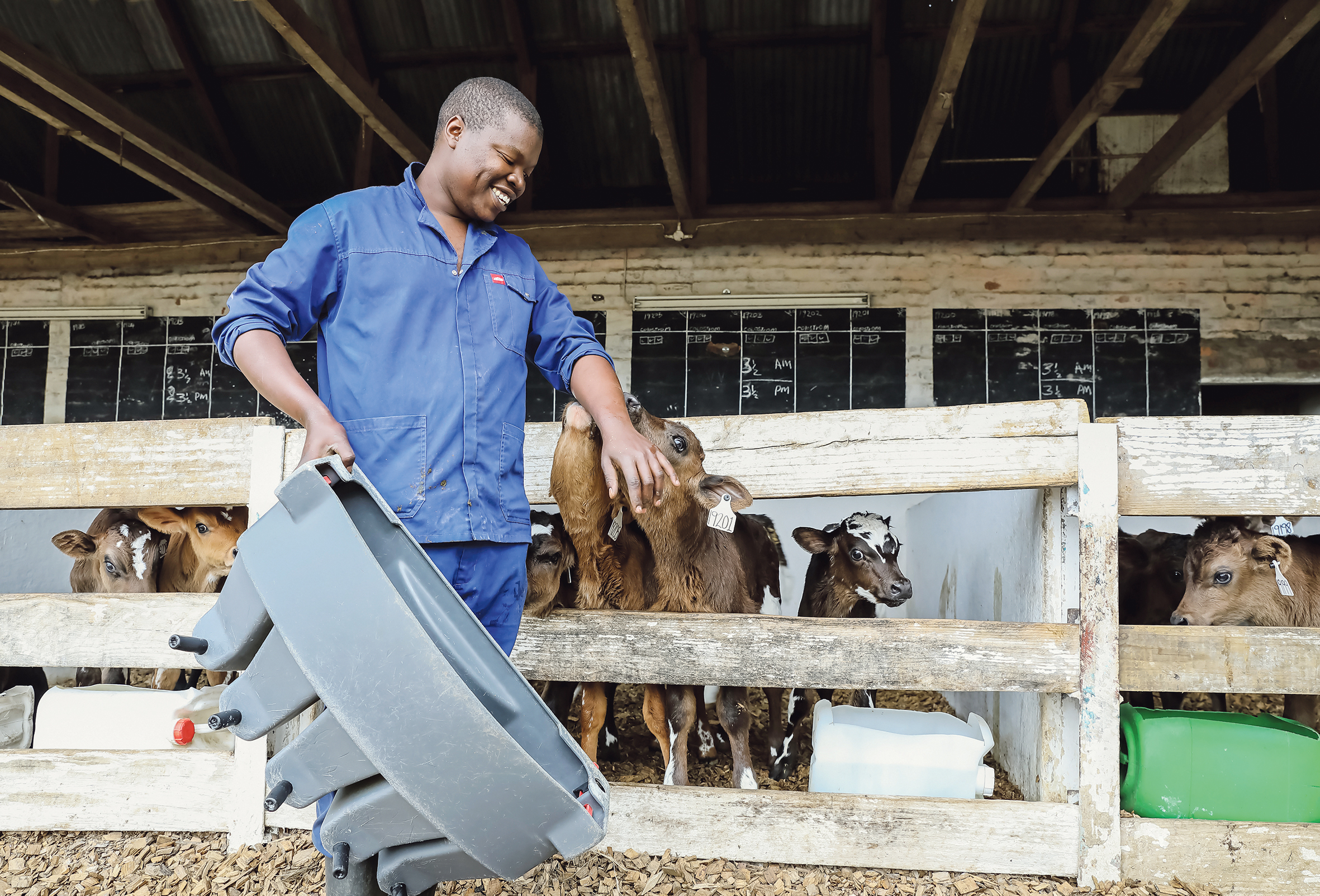
Njabulo Makhathini, one of the first students placed, completed 18 months in the programme mid-2019 and subsequently obtained his National Diploma in Farm Management and has been a permanent employee on the Stapylton-Smith’s dairy farm since then. (Photo: Lianne Ashton)
Recently HGA lent IPC the money (interest free) to purchase a hammermill “inspired by the success this has achieved in the Mazabakweni community where an increasing number of households have been cultivating maize in their home gardens as the opportunity is now there for them to mill their own maize”.
Mazibuko speaks glowingly of HGA, describing Weyer as his mentor. His hope is that with time IPC will plant on more of the land and offer more jobs to unemployed youth in his village.
He says they still need assistance, particularly for their plan to plant fruit, but he speaks with a sense of dignity and purpose.
Given that IPC is about the same age as HGA, it acts as a kind of proof of concept that these partnerships can work.
Finally, according to Weyer, a major thrust of HGA’s work is to support community-based projects that aim to improve household food security through local food gardens, such as one known as One Home, One Garden, run by a community co-op in Hlutankungu. This involves upskilling, planting demonstrations and teaching basic agricultural techniques in communities.
According to Weyer: “People have the land, but lack the initial starter packs to get going.” Since the programme started many households are now growing food and “several hundred projects” are supported.
After speaking to Weyer, Nzimande and Mazibuko, I can confirm that HGA is the exciting project Weyer promised to tell me about when he first reached out to DM168.
For once, a legend of the freedom struggle and son of the KZN Midlands soil, Harry Gwala, can be proud of a project that is being carried out in his name. It is scalable and eminently replicable in other farming districts of South Africa, and we can only hope that other farmers and communities will choose to follow its example. DM168
Harry Gwala Agri is registered as a non-profit organisation. Contact Dylan Weyer at [email protected].
This story first appeared in our weekly Daily Maverick 168 newspaper, which is available countrywide for R25.




















 Become an Insider
Become an Insider
Let’s have more positive nation-building stories like this, DM!
This is an inspiring story and should be a model for farming partnerships throughout the country. However, in the 21st century one has to question the feudalism that exists in the African communities where the “Amakhosi” control the land. Surely the first place for land reform is in the rural areas to enable occupiers to have the freehold and to use this as a basis for financial assistance from lenders? Of course there will be the usual cries that the chiefs know best, that the “peasants’ don’t know what’s good for them and so on. In my experience the people have great common sense, and with suitable protections built in, can develop independent small farms over time. Perhaps it’s also time to re-establish agricultural co-ops in these areas as well. They worked well until they became politicised.
As someone who’s lived for 20 years in a communal area in the former-Transkei I can say with certainty that you misrepresent the role of Amakhosi/iinkosi. Households own their own land and no inkosi can tell them what to do with it. People see their ownership as being as legal/enforceable as a city dweller regards their own land. Despite no title deeds.
The role of traditional leaders is a little more complex when it comes to communal grazing lands. If a community member – e.g. a young man or newly married couple – need a location to build a new home then there is a community process whereby land is allocated to them which is overseen by the chief. There is a nominal payment of a few hundred rand which is usually used to pay for the celebration at the site handover ceremony. These are ancient traditions.
Things only get more complicated when outsiders seek land. For example if someone wants to open a shop or petrol station. Here the traditional law is not very clear and there has been abuse. The creation of the Ingonyama Trust was one approach to deal with this as it would allow for the issuing of a legal lease which would allow investors to get bank financing for their project. In the Transkei there is no equivalent Trust/legal super structure hence no leases are possible which may put a limit on potential investments. The upside for the Transkei is that land is more protected against exploitative external investment. Either way, the chief’s power in this is exaggerated.
I am so happy to read about the success of the Harry Gwala Agri Project!
My very best wishes to Harry Gwala for his simple, but hugely successful project. Not only enabling the community to provide food for themselves, but also creating an opportunity to become financially independent.
Well done! and hopefully an example to other farmers to engage with local communities.
Good news in a sea of bad. It seems foolish to hope these days, but let’s hope regardless.
Worthwhile looking at the early years of Wits in training agricultural officers. That effort created a generation of white farmers.
Time now to do it all again, for the best reasons.
These farmers have planted hope where there was only despair. The crop of purposeful smiling people really raised my spirits with theirs. A wonderful story!
All good wishes!
This article has made me very happy! During almost 20 years of practising as a dietitian the issue of food security always interested me as well as dismayed me. It is an absolute shame for there to be malnutrition (undernutrition) in our country where plenty resources exist but these are diverted into selfish pockets. So it is wonderful to see the forward-thinking of these caring farmers. LOVE the initiative of One Home One Garden – exactly!!! At university we were taught that a veg garden the size of a door can feed a small family. Come on, South Africa, grow your own, eat your own. We shouldn’t have to import much food. Many health problems can be overcome by eating fewer refined grains and eating a lot more vegetables and we can keep prices affordable by growing one’s own or getting behind community gardens. Well done HGA and IPC! Would love to meet you one day and walk on your soil.
Farming co-ops are definitely the way to go. The people involved in these projects have to stand firm against those who will try to politicise this burgeoning prosperity for all. The more you publish stories like this, the more SA will know how great our citizens are and what they are doing for each other. We have to cancel the sickening behaviour of criminal politicians that have chosen to divide SA for their own gain.
It is here where the DM falls short. We need a whole forum dedicated to the positive things citizens do. There are plenty of them.
Wonderful to read such a positive story of community partnerships. Initiatives such as Harry Gwala Agri need to be spread to other community needs and partnerships formed for a sustainable future in South Africa. It will not come from Government.
What an inspiring story.
Together with a couple of colleagues, we are working with smallholder farmers in Gauteng. This article gave me some idea that we could incorporate into our project plan. It is our intention to “co-create and foster socioeconomically vibrant communities with agriculture at its core”.